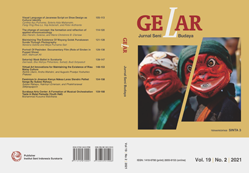Feminism in song of jineman kenya ndesa laras slendro pathet sanga
Main Article Content
Abstract
Abstract
Feminism in Sukesi Rahayu's Jineman Kenya Ndesa laras slendro pathet sanga is a study that reviews feminist discourses on the creation of gamelan music based on the issues of gender equality between women and men. The purpose of this research is to prove and show that the creation of Javanese karawitan is not only based on male paradigm domination, but women also have a role in speaking out about feminism through karawitan works. The research methodology used is descriptive qualitative by positioning the object of study as the primary focus and writings on feminism as supporting sources. The results of this study indicate that in Sukesi Rahayu's Jineman Kenya Ndesa Slendro Sanga, there is feminist content, namely an attempt to elevate the dignity of women, which in this case is sindhen, within the scope of Javanese art culture as well as women in general.
Keywords: Feminism; Sindhenan; Javanese culture
Downloads
Article Details
Copyright
Authors who publish with Gelar: Jurnal Seni Budaya agrees to the following terms:
- Authors retain copyright and grant the journal right of first publication with the work simultaneously licensed under a Creative Commons Attribution License (CC BY-SA 4.0) that allows others to share the work with an acknowledgment of the work's authorship and initial publication in this journal.
- Authors are able to enter into separate, additional contractual arrangements for the non-exclusive distribution of the journal's published version of the work (e.g., post it to an institutional repository or publish it in a book), with an acknowledgment of its initial publication in this journal.
- Authors are permitted and encouraged to post their work online (e.g., in institutional repositories or on their website) prior to and during the submission process, as it can lead to productive exchanges, as well as earlier and greater citation of published work.
References
Afifah, Tasya Nurian, Azizah Wiladatur Rahma, and Yusack Tri Nur Cholis. 2020. “Eksploitasi Tubuh Wanita Dalam Iklan Dolce & Gabbana.” Jurnal Audiens 1 (2): 167–74.
Chiliza, Tholakele Henrietta, and Mfundo Mandla Masuku. 2020. "Manifestation of Gender Inequality in Some Zulu Proverbs That Reflect Patriarchal Domination of Women (by Men) within the Zulu Cultural Context." Indilinga African Journal of Indigenous Knowledge Systems 19 (1): 58–69.
Hughes-Freeland, Felicia. 2021. "Performance and Gender in Javanese Palace Tradition." In' Male’and’Female’in Developing Southeast Asia, 181–206. Routledge.
Kim, Mimi E. 2020. “Anti-Carceral Feminism: The Contradictions of Progress and the Possibilities of Counter-Hegemonic Struggle.” Affilia 35 (3): 309–26.
Maharani, Elza Safira. 2019. “Dominasi Perempuan Sebagai Object Visual Dalam Digital Influancer.” In Seminar Nasional Seni Dan Desain 2019, 169–72. Universitas Negeri Surabaya.
Masri, Dedi. 2021. “Keutamaan Pria Sebagai Pemimpin.” ANSIRU PAI: Pengembangan Profesi Guru Pendidikan Agama Islam 5 (2): 156–67.
Mawaddah, Haalin, Suyitno Suyitno, and Raheni Suhita. 2021. “Javanese Women’s Efforts to Face Patriarchal Culture in the Novel Para Priyayi by Umar Kayam.” International Journal of Multicultural and Multireligious Understanding 8 (1): 100–110.
MSi, Setyasih Harini, and Evy Tri Widyahening. 2019. “Women’s Role as the Actor of Citizen Diplomacy to Promote National Identity Based on Local Wisdom.” Researchers World 10 (2): 33–38.
Rahayu, Sukesi. 2018. “Estetika Wangsalan Dalam Lagu Sindhenan Karawitan Jawa.” Gelar: Jurnal Seni Budaya 16 (1).
Sholikhah, Nikmatus, and Ainun Masruroh. 2019. “The Implementation of Feminist Values in Srikandi (Woman Figure on Wayang Story): A Concept to Develop Gender Equality in Java, Indonesia.” In ASEAN/Asian Academic Society International Conference Proceeding Series, 510–14.
Simões, Rita Basílio, Inês Amaral, and Sofia José Santos. 2021. “The New Feminist Frontier on Community-Based Learning. Popular Feminism, Online Misogyny, and Toxic Masculinities.” European Journal for Research on the Education and Learning of Adults 12 (2): 165–77.
Waluyo, Bagus, and Ali Mustofa. 2021. “Gender Equality in Feminine Registers Used by Female Parents in Blitar: A Case Study of Local Wisdom of Addressing among Women with Respect to Their Husbands’ Titles.” Briliant: Jurnal Riset Dan Konseptual 6 (2): 277–89.
Widyawati, Mega, and Eggy Fajar Andalas. 2020. “Dinamika Maskulinitas Dan Nasionalisme Masyarakat Jawa Di Era Majapahit.” Satwika: Kajian Ilmu Budaya Dan Perubahan Sosial 4 (2): 116–29.
